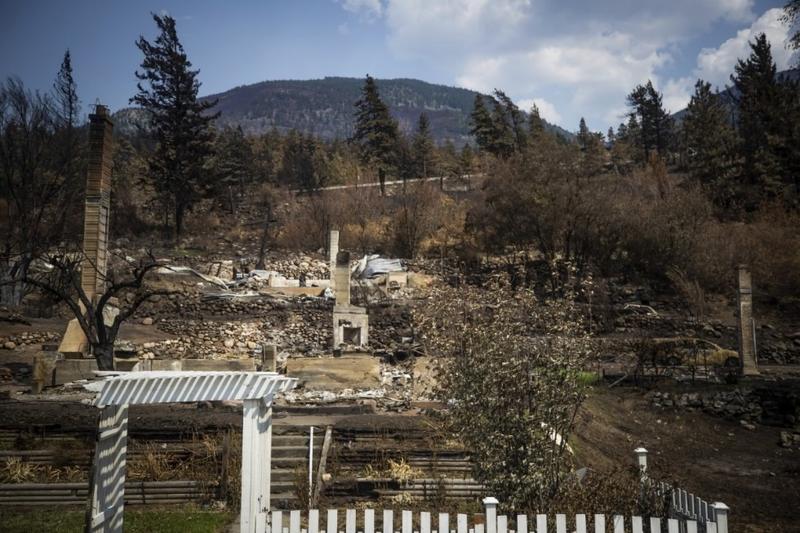 Damaged structures are seen in Lytton, British Columbia, on July 9, 2021, after a wildfire destroyed most of the village on June 30. (DARRYL DYCK / THE CANADIAN PRESS VIA AP)
Damaged structures are seen in Lytton, British Columbia, on July 9, 2021, after a wildfire destroyed most of the village on June 30. (DARRYL DYCK / THE CANADIAN PRESS VIA AP)
The village of Lytton, in the interior of the Canadian province of British Columbia, was virtually wiped out by fire a month ago. It was one of the hundreds of wildfires that have been devastating the area and that underlined the seriousness of global warming.
Moreover, Canada's forests have changed from carbon sinks to net emitters, creating a feedback loop, experts say. As more forests are logged or burned, they release more carbon.
British Columbia, the westernmost province of Canada, is best known for its wet weather but it has not had rain in weeks. Fires continue to burn. By the end of last month about 21,000 properties had been covered by evacuation orders or alerts.
Lytton, which had a population of about 250, was home to dozens of firefighters.
"While all of these firefighters were out fighting the fire, their houses were burning down," said Sue Mark, a university instructor who lives in nearby Kamloops and has many firefighters in her family.
"I can see up to five different forest fires burning around me," Mark said. "Everybody is pretty much ready with duffel bags. Their cars are loaded with water. We've got sprinklers on our roofs ready to turn on at any given minute to protect our homes if we need to."
The conditions are likely to worsen before they improve. Global Forest Watch, which tracks forest fires, said there are more fires now than in previous years. To date, 3,889 high-confidence fire alerts have been reported this year, significantly more compared with other years going back to 2012.
"The worst part right now for the residents in Kamloops is the smoke, because there are so many fires around at the same time and we are in a valley, the smoke is just suffocating," Mark said.
Lytton has emerged as one of the most visible examples of how dangerous prevailing weather conditions can be. The place is often the hottest spot in Canada, despite being relatively far north. It is surrounded by mountains that create a heat bowl.
Sparking national discussion about climate change, Lytton reported on June 29 the highest temperature ever recorded in Canada: 49.6 C. It marked the record during an unusual five-day heat wave. The next day a forest fire razed the village. Residents had just minutes to evacuate.
The British Columbia Wildfire Service said 257 fires were burning in the week ending July 24, compared with about 300 a week earlier. About a quarter of the province has an air quality problem of some kind.
On July 24 specialist firefighters from Mexico arrived to help tackle the wildfires. They were working with the 3,320 firefighters in the province for 30 days. The firefighters, helping Canada every fire season since 2014, include specialists from Mexico's National Forestry Commission, said Berenice Diaz, Mexico's consul-general in Vancouver.
'Worst ever seen'
"This is the worst fire I have seen in Canada since 2017," Diaz said. "The territory of British Columbia is very large, and we can say that practically a little less than half of the territory is already affected by the fires."
Fires are also burning across the northwestern part of the eastern province of Ontario and eastern Manitoba.
Olivier Kolmel, a Montreal-based campaigner and spokesman for Greenpeace, said: "The impacts are many. There are great costs to the devastations we are witnessing, from lost lives, homes and livelihood.
"The scale of the heat wave and the widespread fires in Western Canada and beyond are a clear result of climate change. The scale of this crisis is unprecedented."
Kolmel cited a study by Chris Harley, a professor at the University of British Columbia, which suggests the heat wave may have killed more than a billion marine animals, without counting the wildfires.
"Although wildfires are a natural process of the boreal forest ecosystem, they are increasing in frequency and intensity," Kolmel said. "Bigger, hotter wildfires are turning Canada's vast boreal forest into a significant new source of climate-changing greenhouse gases."
The heat wave in North America in late June "was 150 times more likely due to climate change", Kolmel said, adding: "Heat dome broke record temperatures which has set the stage for a more devastating fire season. Wildfire season is expected to be longer, hotter and drier."
The writers are freelance journalists for China Daily.


